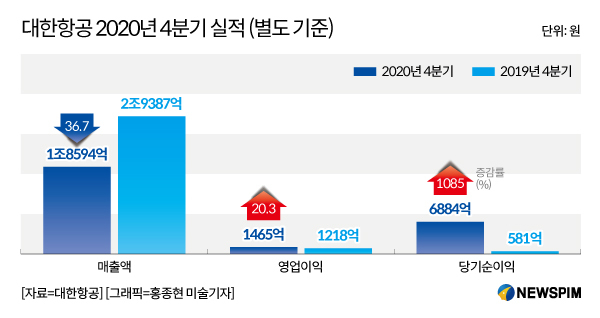Achieved an annual operating profit of 238.3 billion won… Labor cost and fuel cost reduction effect
Cargo sales 66%↑… Increased supply and increased freight rates contribute to profits
“Tr.3.3 proceeds without any bequests and PMI disruption…Maintaining the current level until the second half of passengers”
[서울=뉴스핌] Reporter Kang Myung-yeon = Korean Air continued to decline in sales in the fourth quarter of last year due to the aftermath of a novel coronavirus infection (Corona 19). However, as a result of efforts to reduce costs such as labor and fuel costs, operating profit recorded an increase. The annual basis also achieved an operating surplus thanks to the favorable freight business.
On a separate basis, Korean Air announced on the 4th that its sales in the fourth quarter of last year were KRW 1.859.4 trillion, a 36.7% decrease from the same period last year. During the same period, operating profit increased by 20.3% to 146.5 billion won, and net income increased by 108.5 billion won to 6884 billion won.
 |
On an annual basis, it recorded sales of KRW 7.40 trillion, operating profit of KRW 238.3 billion, and net loss of KRW 228.1 billion.
Sales could not avoid the decline as passengers declined due to Corona 19. Passenger sales declined 74% last year compared to 2019.
On the other hand, last year’s cargo sales increased by 66% compared to 2019 (2,557.5 billion won) to 4.2507 trillion won. This is the result of increasing the utilization rate of cargo planes and actively utilizing idle passenger planes. Although passenger plane operations fell sharply, transportation in the valley (cargo compartment under the passenger plane), which accounts for a large portion of the cargo supply, decreased, but the utilization rate was increased by 25% compared to the previous year by utilizing the existing 23 large cargo planes.
Korean Air increased its supply power by using idle passenger aircraft and converting it into a freighter for the first time in Korea. Air cargo using idle passenger aircraft is transported more than 4,500 flights per year. Globally, the supply of air freight declined compared to the demand for air freight, adding to the positive effects of strong air freight rates.
Among air cargo, the demand for Corona 19 diagnostic kits and auto parts increased significantly. In addition, some shipping demand was driven by air transport, leading the increase in air freight sales.
Operating profit succeeded in achieving an annual surplus as the freight business improved and costs such as labor and fuel costs were reduced. As passenger supply declined and oil price declined, the cost of aviation fuel decreased, and related expenses such as facility usage fees decreased due to the decrease in passenger operations. The reduction in labor costs also had an impact due to the rotational closure of employees. Last year, operating expenses decreased by 40% compared to 2019.
Korean Air is responding to the emergency situation faced by Corona 19 by implementing circular paid and unpaid leave. A Korean Air official said, “The labor union has also been willing to participate as part of the pain sharing for quick management normalization.” It contributed to the profit surplus,” he said.
Net loss of 228.1 billion won was incurred due to the annual net interest expense. However, compared to last year’s net loss of 5687 billion won, the loss has been significantly reduced.
Korean Air has a policy to focus on improving the constitution along with self-reliance in an environment where uncertainty caused by Corona 19 persists. It also speeds up the acquisition of Asiana Airlines.
A Korean Air official said, “We will successfully proceed with a paid-in capital increase of 3.30 trillion won, scheduled for March, to secure liquidity and improve financial structure, and to solve the problem of financing for the acquisition of Asiana Airlines.” “We plan to carry out the integration work (PMI, Post Merger Integration) smoothly after the acquisition of the company.”
Due to the uncertainty caused by Corona 19, the circular closure of employees will continue this year. The sale of the site in Songhyeon-dong, the core of Jaguan, will also continue to be discussed.
In addition, in response to market conditions, we will further strengthen the air cargo business. In particular, with the start of vaccine vaccination for Corona 19, it will start to ship vaccines in earnest from the second quarter, centering on the Vaccine Transportation Task Force (TF).
On the other hand, passenger supply will remain at the current level until the second half of this year. A Korean Air official said, “Unlike the air cargo market, it is difficult to quickly determine the normalization of the airline passenger market. It will be difficult to increase the passenger supply until the vaccine effect appears in earnest.”
